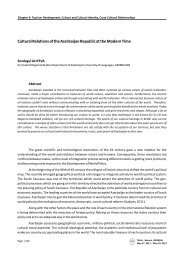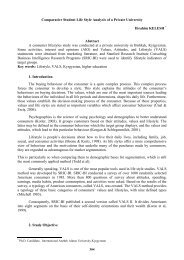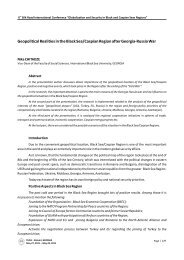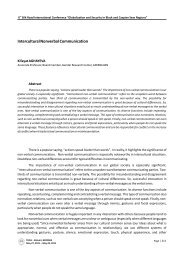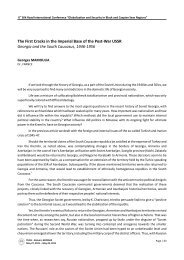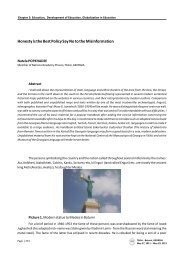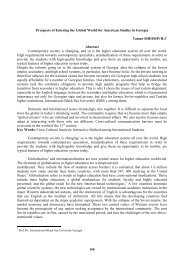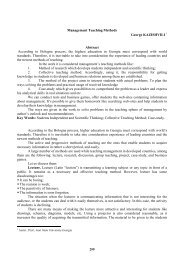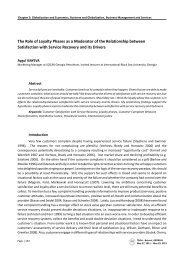Stan McGAHEY, Negative Impacts of Tourism Development on ...
Stan McGAHEY, Negative Impacts of Tourism Development on ...
Stan McGAHEY, Negative Impacts of Tourism Development on ...
Create successful ePaper yourself
Turn your PDF publications into a flip-book with our unique Google optimized e-Paper software.
th<br />
6 Silk Road Internati<strong>on</strong>al C<strong>on</strong>ference “Globalizati<strong>on</strong> and Security in Black and Caspian Seas Regi<strong>on</strong>s”<br />
<str<strong>on</strong>g>Negative</str<strong>on</strong>g> <str<strong>on</strong>g>Impacts</str<strong>on</strong>g> <str<strong>on</strong>g>of</str<strong>on</strong>g> <str<strong>on</strong>g>Tourism</str<strong>on</strong>g> <str<strong>on</strong>g>Development</str<strong>on</strong>g> <strong>on</strong> Local People in Traditi<strong>on</strong>al Areas<br />
<str<strong>on</strong>g>Stan</str<strong>on</strong>g> <str<strong>on</strong>g>McGAHEY</str<strong>on</strong>g><br />
Dr. , Saint Leo University, USA<br />
Abstract<br />
This paper examines the negative impacts <str<strong>on</strong>g>of</str<strong>on</strong>g> tourism development <strong>on</strong> local people in traditi<strong>on</strong>al areas where<br />
tourism is being introduced as a new industry or where tourism is being expanded to the point that it creates oppositi<strong>on</strong><br />
am<strong>on</strong>g the local people. A number <str<strong>on</strong>g>of</str<strong>on</strong>g> documented examples from various parts <str<strong>on</strong>g>of</str<strong>on</strong>g> the world discuss factors such as why<br />
tourism development was initiated, who made the decisi<strong>on</strong>s, which benefitted the most, why local people began to oppose<br />
it, and what the affects <str<strong>on</strong>g>of</str<strong>on</strong>g> their oppositi<strong>on</strong> were <strong>on</strong> the tourism development and <strong>on</strong> their community. <str<strong>on</strong>g>Tourism</str<strong>on</strong>g> is a leading<br />
ec<strong>on</strong>omic engine for many countries around the world, and it can be an outstanding ec<strong>on</strong>omic development opti<strong>on</strong> for<br />
many traditi<strong>on</strong>al areas. But it is not a panacea. Proper tourism development must be preceded by detailed policy and<br />
planning that includes the interests and input <str<strong>on</strong>g>of</str<strong>on</strong>g> all stakeholders, especially the local people. The Black and Caspian Seas<br />
regi<strong>on</strong> has many traditi<strong>on</strong>al areas with significant tourism potential. The purpose <str<strong>on</strong>g>of</str<strong>on</strong>g> this paper is to serve as a cauti<strong>on</strong>ary<br />
tale <str<strong>on</strong>g>of</str<strong>on</strong>g> tourism development that ignores or bypasses the best interests <str<strong>on</strong>g>of</str<strong>on</strong>g> the local people. It is written from this<br />
perspective and with this specific audience in mind.<br />
I. Introducti<strong>on</strong><br />
This paper examines the negative impacts <str<strong>on</strong>g>of</str<strong>on</strong>g> tourism development <strong>on</strong> local people in traditi<strong>on</strong>al areas<br />
where tourism is being introduced as a new industry or where existing tourism is being expanded to the point<br />
that it creates oppositi<strong>on</strong> am<strong>on</strong>g the local people.<br />
There are many documented examples from various parts <str<strong>on</strong>g>of</str<strong>on</strong>g> the world that discuss factors, such as:<br />
· Why tourism development was initiated.<br />
· Who made the decisi<strong>on</strong>s.<br />
· Who benefitted the most from tourism development.<br />
· Why local people began to oppose tourism development.<br />
· What the affects <str<strong>on</strong>g>of</str<strong>on</strong>g> their oppositi<strong>on</strong> were <strong>on</strong> the tourism development and <strong>on</strong> their community.<br />
<str<strong>on</strong>g>Tourism</str<strong>on</strong>g> is a leading ec<strong>on</strong>omic engine for many countries around the world, and it can be an<br />
outstanding ec<strong>on</strong>omic development opti<strong>on</strong> for many traditi<strong>on</strong>al areas. But it is not a panacea. Like all forms <str<strong>on</strong>g>of</str<strong>on</strong>g><br />
development, tourism has impacts, especially ec<strong>on</strong>omic, socio-cultural, and envir<strong>on</strong>mental. Whether they are<br />
positive or negative impacts and whether they are major or minor impacts depends <strong>on</strong> many factors.<br />
Proper tourism development begins with detailed policy and planning that includes the interests and<br />
input <str<strong>on</strong>g>of</str<strong>on</strong>g> all stakeholders, especially the local people.<br />
Tbilisi - Batumi, GEORGIA<br />
May 27, 2011 – May 29, 2011<br />
Page | 237
Chapter 4: <str<strong>on</strong>g>Tourism</str<strong>on</strong>g> <str<strong>on</strong>g>Development</str<strong>on</strong>g>, Culture and Cultural Identity, Cross-Cultural Relati<strong>on</strong>ships<br />
The Southern Caucasus and other regi<strong>on</strong>s al<strong>on</strong>g the entire length <str<strong>on</strong>g>of</str<strong>on</strong>g> the Silk Road have many traditi<strong>on</strong>al<br />
areas that possess significant tourism potential. The purpose <str<strong>on</strong>g>of</str<strong>on</strong>g> this paper is to serve as a cauti<strong>on</strong>ary tale <str<strong>on</strong>g>of</str<strong>on</strong>g><br />
tourism development that ignores or bypasses the best interests <str<strong>on</strong>g>of</str<strong>on</strong>g> the local people. It is written from this<br />
perspective and with this specific purpose in mind.<br />
II. <str<strong>on</strong>g>Tourism</str<strong>on</strong>g>'s Stakeholders<br />
The tourism industry has many stakeholders. We can view it as a triangle. At the base <str<strong>on</strong>g>of</str<strong>on</strong>g> the triangle is<br />
the community, and <strong>on</strong> the two sides that meet at the top, are the government <strong>on</strong> <strong>on</strong>e side and the tourism<br />
industry <strong>on</strong> the other. The community is at the bottom because its home is the destinati<strong>on</strong>, and it is their<br />
natural and cultural resources that the tourism industry is built up<strong>on</strong>. Therefore, it is the local people who feel<br />
the most impacts, both good and bad. The comm<strong>on</strong>ly-used term “community-based tourism” reflects this<br />
paradigm.<br />
The government is <strong>on</strong> <strong>on</strong>e side because tourism policy and planning begins with the government, and it<br />
creates the enabling legislati<strong>on</strong> and c<strong>on</strong>trols the legal framework. The government is also the arbiter <str<strong>on</strong>g>of</str<strong>on</strong>g><br />
c<strong>on</strong>flicting interests for the use <str<strong>on</strong>g>of</str<strong>on</strong>g> resources. It missi<strong>on</strong> is to look after the best interests <str<strong>on</strong>g>of</str<strong>on</strong>g> all the people.<br />
The tourism industry is <strong>on</strong> the other side because it will invest in the development <str<strong>on</strong>g>of</str<strong>on</strong>g> facilities and<br />
attracti<strong>on</strong>s, and it will manage and operate them. It will either make or lose m<strong>on</strong>ey, and in the process, either<br />
makes the destinati<strong>on</strong> a tourism success or failure.<br />
As the tourism industry blossoms and grows into a successful destinati<strong>on</strong>, it will create opportunities<br />
for the support businesses that supply it, such as food wholesalers, furniture stores, c<strong>on</strong>structi<strong>on</strong> companies,<br />
and banks. When tourism grows, the entire ec<strong>on</strong>omy grows. The old saying is: “A high tide lifts all boats.” And,<br />
when tourism does well in a destinati<strong>on</strong>, many other businesses will also prosper. Unfortunately, the same<br />
holds true for the opposite effect.<br />
III. Why Develop <str<strong>on</strong>g>Tourism</str<strong>on</strong>g>?<br />
The <strong>on</strong>ly reas<strong>on</strong> to develop tourism anywhere in the world is to benefit the local people. That sounds<br />
simple and easy to do. But <str<strong>on</strong>g>of</str<strong>on</strong>g>ten, it is neither. When we develop tourism we create new destinati<strong>on</strong>s.<br />
Destinati<strong>on</strong>s are the places people visit for pleasure. They want to explore the area's natural and cultural<br />
attracti<strong>on</strong>s, engage in their favorite activities, enjoy some nightlife and entertainment, interact with the local<br />
people, or just simply relax. Some destinati<strong>on</strong>s attract primarily business travelers, but this paper will focus <strong>on</strong><br />
those that appeal to pleasure travelers.<br />
Developing a destinati<strong>on</strong> means that certain infrastructure must be put into place. Often that means<br />
improved roads, and utilities, such as electricity, water, sewage, and telecommunicati<strong>on</strong>s, and maybe even a<br />
new or upgraded airport or seaport. Essential support services, such as police and fire protecti<strong>on</strong> and heath<br />
care, must either be added or improved. To become a real destinati<strong>on</strong>, facilities and services must be provided<br />
from all four <str<strong>on</strong>g>of</str<strong>on</strong>g> the operati<strong>on</strong>al sectors <str<strong>on</strong>g>of</str<strong>on</strong>g> the tourism industry. Those are transportati<strong>on</strong>, attracti<strong>on</strong>s,<br />
accommodati<strong>on</strong>s, and food service.<br />
That's a lot <str<strong>on</strong>g>of</str<strong>on</strong>g> new business activity for a community to absorb. And, we haven't even added the<br />
tourists yet, and they may come from many cultures, with different behaviors and moral standards and<br />
different languages and religi<strong>on</strong>s, and, hopefully, also with lots <str<strong>on</strong>g>of</str<strong>on</strong>g> m<strong>on</strong>ey to spend.<br />
<str<strong>on</strong>g>Tourism</str<strong>on</strong>g> develops <strong>on</strong> its own wherever there is a market. But we study tourism, and we research it, to<br />
find the best ways to develop it to gain the benefits we are seeking in the most efficient and least costly manner.<br />
Normally, the primary benefit that communities are seeking is ec<strong>on</strong>omic. And, tourism is the world's largest<br />
industry. It is the leading industry in many countries, both big and small, including island nati<strong>on</strong>s that do not<br />
have a viable base for manufacturing, agricultural exports, extractive industries, or high-end services, such as<br />
Page | 238<br />
Tbilisi - Batumi, GEORGIA<br />
May 27, 2011 – May 29, 2011
th<br />
6 Silk Road Internati<strong>on</strong>al C<strong>on</strong>ference “Globalizati<strong>on</strong> and Security in Black and Caspian Seas Regi<strong>on</strong>s”<br />
banking and insurance. All that tourism requires is attractive natural and/or cultural resources that can be<br />
developed to appeal to tourists who have the time, m<strong>on</strong>ey, and health to visit them.<br />
IV. Who Develops <str<strong>on</strong>g>Tourism</str<strong>on</strong>g>?<br />
So who develops tourism? Let's look at three basic possibilities: governments, entrepreneurs, and<br />
local people. This is basically the same triangle <str<strong>on</strong>g>of</str<strong>on</strong>g> stakeholders previously menti<strong>on</strong>ed. As we discuss each <strong>on</strong>e,<br />
let's keep in mind its specific motivati<strong>on</strong>s.<br />
Governments at all levels are interested in tourism. Governments are acutely aware <str<strong>on</strong>g>of</str<strong>on</strong>g> the need to<br />
provide jobs and improve the income <str<strong>on</strong>g>of</str<strong>on</strong>g> their people. Governments also love to collect and spend tax m<strong>on</strong>ey,<br />
and residents appreciate receiving more and better public services. <str<strong>on</strong>g>Tourism</str<strong>on</strong>g> is big business, so it generates<br />
large amounts <str<strong>on</strong>g>of</str<strong>on</strong>g> tax revenue. One <str<strong>on</strong>g>of</str<strong>on</strong>g> the most appealing features about tax revenue that is generated from<br />
tourism is that most <str<strong>on</strong>g>of</str<strong>on</strong>g> it is paid by tourists, who are n<strong>on</strong>-residents, and also n<strong>on</strong>-voters. Government <str<strong>on</strong>g>of</str<strong>on</strong>g>ficials<br />
like to report ec<strong>on</strong>omic growth, especially when it takes place in previously under-developed or impoverished<br />
areas. Governments are usually resp<strong>on</strong>sible for large-scale planning, z<strong>on</strong>ing and land use schemes, industry<br />
licensing and regulati<strong>on</strong>s, and the investment incentives necessary to lure outside m<strong>on</strong>ey.<br />
<str<strong>on</strong>g>Tourism</str<strong>on</strong>g> industry <str<strong>on</strong>g>of</str<strong>on</strong>g>ficials always look for new opportunities. They may also fund development or they<br />
may be brought into the plan for their expertise after investors have been identified. Government <str<strong>on</strong>g>of</str<strong>on</strong>g>ficials<br />
<str<strong>on</strong>g>of</str<strong>on</strong>g>ten rely <strong>on</strong> their tourism industry colleagues for guidance during the planning and development process.<br />
<str<strong>on</strong>g>Tourism</str<strong>on</strong>g> industry <str<strong>on</strong>g>of</str<strong>on</strong>g>ficials are <str<strong>on</strong>g>of</str<strong>on</strong>g>ten not from the immediate area <str<strong>on</strong>g>of</str<strong>on</strong>g> the proposed development. This means<br />
their interests are purely financial. They have no vested interest and no emoti<strong>on</strong>al attachment to the<br />
destinati<strong>on</strong>. If it has the potential to make m<strong>on</strong>ey, they are interested. If it lacks potential, they lack interest.<br />
With a pure pr<str<strong>on</strong>g>of</str<strong>on</strong>g>it motive, they <str<strong>on</strong>g>of</str<strong>on</strong>g>ten view negative impacts as just <strong>on</strong>e <str<strong>on</strong>g>of</str<strong>on</strong>g> the costs <str<strong>on</strong>g>of</str<strong>on</strong>g> doing business, and they<br />
factor them into the overall situati<strong>on</strong>.<br />
For local people, developing tourism means an opportunity to improve the ec<strong>on</strong>omy <str<strong>on</strong>g>of</str<strong>on</strong>g> their<br />
community. It can mean more jobs, increased income, an easier and more certain way to make a living, and a<br />
sign <str<strong>on</strong>g>of</str<strong>on</strong>g> progress. <str<strong>on</strong>g>Tourism</str<strong>on</strong>g> can improve their quality <str<strong>on</strong>g>of</str<strong>on</strong>g> life. People who reside in the destinati<strong>on</strong> are known<br />
collectively as the host community, and if they are to actually play host to their visitors, they must also become<br />
involved in owning and managing tourism businesses, not just performing menial labor. Governments need to<br />
make sure that local people are also given investment incentives. Even <strong>on</strong> a small scale, such as opening a local<br />
tour company, serving as a tour guide, running a bed & breakfast, owning a restaurant, or being part <str<strong>on</strong>g>of</str<strong>on</strong>g> a crafts<br />
cooperative, locals should be given the appropriate support they will need to be successful.<br />
V. No Benefits, No Support<br />
For the local people, tourism development must be d<strong>on</strong>e properly. They cannot pull the plug and move<br />
<strong>on</strong> to another promising locati<strong>on</strong>. The destinati<strong>on</strong> being developed is their home. They stay put, and if tourism<br />
development is not successful, they will suffer the c<strong>on</strong>sequences while others are free to move <strong>on</strong> to greener<br />
pastures. For the local populati<strong>on</strong>, tourism must be developed in a way that embraces who they are and how<br />
they live. Many destinati<strong>on</strong>s are building their industry around their cultural and natural attributes and the<br />
meaningful involvement <str<strong>on</strong>g>of</str<strong>on</strong>g> local people from the initial c<strong>on</strong>ceptual stages all the way through to management<br />
and ownership.<br />
Local people can deal with incremental change, but not the drastic changes that are sometimes<br />
introduced by big government and big business. As menti<strong>on</strong>ed, all development creates change, especially<br />
tourism development. For the local people to benefit from tourism, meaning the better jobs, ownership <str<strong>on</strong>g>of</str<strong>on</strong>g><br />
services and facilities, and leadership positi<strong>on</strong>s within the tourism industry, tourism must not develop at a<br />
faster pace than their ability to grow with it. Otherwise, they get left behind. Outsiders will c<strong>on</strong>trol their<br />
industry, and they will be marginalized. Throughout the tourism development process, public hearings should<br />
Tbilisi - Batumi, GEORGIA<br />
May 27, 2011 – May 29, 2011<br />
Page | 239
Chapter 4: <str<strong>on</strong>g>Tourism</str<strong>on</strong>g> <str<strong>on</strong>g>Development</str<strong>on</strong>g>, Culture and Cultural Identity, Cross-Cultural Relati<strong>on</strong>ships<br />
be held to explain the proposals in detail and get local opini<strong>on</strong>s <strong>on</strong> them. Public awareness <str<strong>on</strong>g>of</str<strong>on</strong>g> tourism, al<strong>on</strong>g<br />
with tourism educati<strong>on</strong> and training that leads to good jobs, must be provided.<br />
One <str<strong>on</strong>g>of</str<strong>on</strong>g> the biggest criticisms <str<strong>on</strong>g>of</str<strong>on</strong>g> tourism development is that most <str<strong>on</strong>g>of</str<strong>on</strong>g> the benefits go to outside<br />
investors. Investors obviously have a right to make m<strong>on</strong>ey. That is why they invested in the local tourism<br />
industry. But the people who call the destinati<strong>on</strong> home must also receive substantial benefits. Too many<br />
times and too many places, it is announced that tourism has c<strong>on</strong>tributed milli<strong>on</strong>s <str<strong>on</strong>g>of</str<strong>on</strong>g> dollars to an ec<strong>on</strong>omy, but<br />
local people look around and w<strong>on</strong>der who am<strong>on</strong>g them have experienced any direct benefits. They just notice<br />
that their community has become more crowded, more expensive, and less familiar. Hanks (2007) menti<strong>on</strong>s<br />
this injustice in her article <strong>on</strong> The Nine Paradoxes <str<strong>on</strong>g>of</str<strong>on</strong>g> Modern <str<strong>on</strong>g>Tourism</str<strong>on</strong>g>.<br />
VI. Affects <strong>on</strong> <str<strong>on</strong>g>Tourism</str<strong>on</strong>g> Industry<br />
Eventually, some <str<strong>on</strong>g>of</str<strong>on</strong>g> the local people will begin to feel disaffected. They know what they have given up<br />
since tourism was developed, but they do not know what they have gained from it, although they know that<br />
some people have certainly benefitted. They not <strong>on</strong>ly do not support tourism, they begin to openly oppose it.<br />
The tourism industry depends <strong>on</strong> local people for many things, including its work force, and tourism is a<br />
labor-intensive industry. If the pool <str<strong>on</strong>g>of</str<strong>on</strong>g> local applicants does not support tourism, then the industry is in trouble.<br />
It will either have disgruntled employees, who are not very hospitable, or they must attract new employees<br />
from elsewhere, and that would be costly and further antag<strong>on</strong>ize the locals.<br />
Since the local people are the host community, they are key ingredients in the ambiance and<br />
atmosphere required for a successful pleasure travel destinati<strong>on</strong>. They are a big part <str<strong>on</strong>g>of</str<strong>on</strong>g> what makes up the<br />
destinati<strong>on</strong>'s sense <str<strong>on</strong>g>of</str<strong>on</strong>g> place and its sense <str<strong>on</strong>g>of</str<strong>on</strong>g> spirit. This is what differentiates <strong>on</strong>e destinati<strong>on</strong> from another and<br />
makes each <strong>on</strong>e special or unique. If the locals do not c<strong>on</strong>tribute substantially to this comp<strong>on</strong>ent <str<strong>on</strong>g>of</str<strong>on</strong>g> the<br />
destinati<strong>on</strong>'s appeal, it will not exist <strong>on</strong> a pers<strong>on</strong>al level, and that is how human beings c<strong>on</strong>nect, <strong>on</strong>e to another.<br />
Perhaps that is why the tourism industries <strong>on</strong> many islands are successful primarily as cruise stopovers for a few<br />
hours <str<strong>on</strong>g>of</str<strong>on</strong>g> port call, or they <str<strong>on</strong>g>of</str<strong>on</strong>g>fer <strong>on</strong>ly enclave tourism, where tourists stay at resorts walled <str<strong>on</strong>g>of</str<strong>on</strong>g>f from the locals<br />
and venture outside <strong>on</strong>ly <strong>on</strong> special tours or <strong>on</strong> their return trip to the airport.<br />
The researcher, George Doxey, developed the Irritati<strong>on</strong> Index, also known as the Irridex, to explain how<br />
local people go through stages <str<strong>on</strong>g>of</str<strong>on</strong>g> welcoming tourists when tourism is a new industry at a destinati<strong>on</strong> and the<br />
number <str<strong>on</strong>g>of</str<strong>on</strong>g> tourists, as well as their impact, is low, to Apathy as tourism becomes an established industry, and<br />
later to Annoyance, where locals begin to blame tourists for many <str<strong>on</strong>g>of</str<strong>on</strong>g> their community problems, and finally<br />
reaching Antag<strong>on</strong>ism, where locals began to treat tourists with verbal or even physical abuse (Reisinger, 2009).<br />
When the situati<strong>on</strong> turns to Antag<strong>on</strong>ism, it is obvious that there is a severe disc<strong>on</strong>nect between the<br />
tourists and the host community. Perhaps this could have been avoided if the local people had been more<br />
involved in all phases <str<strong>on</strong>g>of</str<strong>on</strong>g> tourism development from the early stages <str<strong>on</strong>g>of</str<strong>on</strong>g> planning through to the present day<br />
management and operati<strong>on</strong>s. Once the Irridex has reached the Antag<strong>on</strong>ism stage, the tourism industry begins<br />
to suffer substantially, and drastic steps must be taken to revitalize it from the grassroots upward.<br />
This coincides with the Decline stage <str<strong>on</strong>g>of</str<strong>on</strong>g> the Tourist Area Life Cycle developed by the researcher, Richard<br />
Butler. In the Decline stage the destinati<strong>on</strong> has lost its appeal, and it is losing its market share (Butler, 2006).<br />
Now it must hurry up and reinvent itself, or it will <strong>on</strong>ly survive by <str<strong>on</strong>g>of</str<strong>on</strong>g>fering the lowest rates and accepting any<br />
type <str<strong>on</strong>g>of</str<strong>on</strong>g> tourist behavior.<br />
VII. Examples <str<strong>on</strong>g>of</str<strong>on</strong>g> Oppositi<strong>on</strong> to <str<strong>on</strong>g>Tourism</str<strong>on</strong>g> <str<strong>on</strong>g>Development</str<strong>on</strong>g><br />
There are many examples <str<strong>on</strong>g>of</str<strong>on</strong>g> destinati<strong>on</strong>s that have fought <str<strong>on</strong>g>of</str<strong>on</strong>g>f tourism development or mounted<br />
oppositi<strong>on</strong> as it c<strong>on</strong>tinues to grow and negatively impacts the local people. Sometimes the oppositi<strong>on</strong> is quite<br />
dem<strong>on</strong>strative, and other times it is subtle and simmers just below the surface. Following are six examples<br />
Page | 240<br />
Tbilisi - Batumi, GEORGIA<br />
May 27, 2011 – May 29, 2011
th<br />
6 Silk Road Internati<strong>on</strong>al C<strong>on</strong>ference “Globalizati<strong>on</strong> and Security in Black and Caspian Seas Regi<strong>on</strong>s”<br />
from six destinati<strong>on</strong>s that are available <strong>on</strong> the Internet: three posted <strong>on</strong> YouTube.com, followed three from<br />
print sources.<br />
1. The Spanish island <str<strong>on</strong>g>of</str<strong>on</strong>g> Mallorca is a popular destinati<strong>on</strong> for these types <str<strong>on</strong>g>of</str<strong>on</strong>g> studies, so here are three<br />
web addresses that detail how tourism has changed Mallorca into a mass tourism destinati<strong>on</strong>, destroyed local<br />
agriculture, and left villages devoid <str<strong>on</strong>g>of</str<strong>on</strong>g> their traditi<strong>on</strong>al culture.<br />
http://www.youtube.com/watch?v=8-nQuh1OjdI&feature=related<br />
http://www.youtube.com/watch?v=Dwo7xsVpiNc&feature=related<br />
http://www.youtube.com/watch?v=zDwzsCGCKH8<br />
2. Next is a 2003 documentary from Mexico, entitled “<str<strong>on</strong>g>Tourism</str<strong>on</strong>g> in Cancun: Success or Disaster?”<br />
http://www.youtube.com/watch?v=ipUfil8pU-Y<br />
3. Jamaica is a popular island destinati<strong>on</strong> in the Caribbean. But who is its tourism industry really<br />
benefitting? Check out this web site and the video below for a scathing expose.<br />
http://web.mac.com/vagab<strong>on</strong>dmedia1/iWeb/Jamaicaforsale.net/About%20the%20film.html<br />
http://www.youtube.com/watch?v=oUDE1qLdaKM<br />
4. “Goa under Siege” tells the story <str<strong>on</strong>g>of</str<strong>on</strong>g> how mass tourism development has created negative ec<strong>on</strong>omic<br />
and socio-cultural impacts for the indigenous populati<strong>on</strong> <str<strong>on</strong>g>of</str<strong>on</strong>g> this former Portuguese enclave located <strong>on</strong> India’s<br />
Arabian Sea coast.<br />
http://www.youtube.com/watch?v=EPpzKc7_sf4<br />
5. “Hawaii locals say tourists make lousy neighbors” reveals how the proliferati<strong>on</strong> <str<strong>on</strong>g>of</str<strong>on</strong>g> unlicensed shortterm<br />
house rentals and B&Bs has ruined the peace and quiet <str<strong>on</strong>g>of</str<strong>on</strong>g> residential neighborhoods.<br />
http://www.msnbc.msn.com/id/23448422/ns/travel-news/t/hawaii-locals-say-tourists-make-lousyneighbors/<br />
6. “Death <str<strong>on</strong>g>of</str<strong>on</strong>g> Venice? Tourists pour in as residents head out” describes the plight <str<strong>on</strong>g>of</str<strong>on</strong>g> locals who can no<br />
l<strong>on</strong>ger afford to live in a city that is overrun by tourists.<br />
http://www.nytimes.com/2006/09/29/world/europe/29iht-venice.2983287.html<br />
7. “Barcel<strong>on</strong>a rebels against tourist invasi<strong>on</strong>” reports resident’s complaints about overcrowding and<br />
public nudity.<br />
http://www.guardian.co.uk/world/2010/jun/13/barcel<strong>on</strong>a-rebels-against-tourist-invasi<strong>on</strong><br />
References<br />
Butler, R. (2006). The <str<strong>on</strong>g>Tourism</str<strong>on</strong>g> Area Life Cycle: Applicati<strong>on</strong>s and Modificati<strong>on</strong>s. L<strong>on</strong>d<strong>on</strong>: Channel View<br />
Publicati<strong>on</strong>s.<br />
Reisinger, Y (2009). Internati<strong>on</strong>al <str<strong>on</strong>g>Tourism</str<strong>on</strong>g>: Cultures and Behaviors. L<strong>on</strong>d<strong>on</strong>: Butterworth-Heinemann.<br />
Shanks, C. (2007). The 9 Paradoxes <str<strong>on</strong>g>of</str<strong>on</strong>g> Modern <str<strong>on</strong>g>Tourism</str<strong>on</strong>g>. Retrieved from<br />
http://www.bravenewtraveler.com/2007/07/16/the-9-paradoxes-<str<strong>on</strong>g>of</str<strong>on</strong>g>-modern-tourism/<br />
Tbilisi - Batumi, GEORGIA<br />
May 27, 2011 – May 29, 2011<br />
Page | 241



